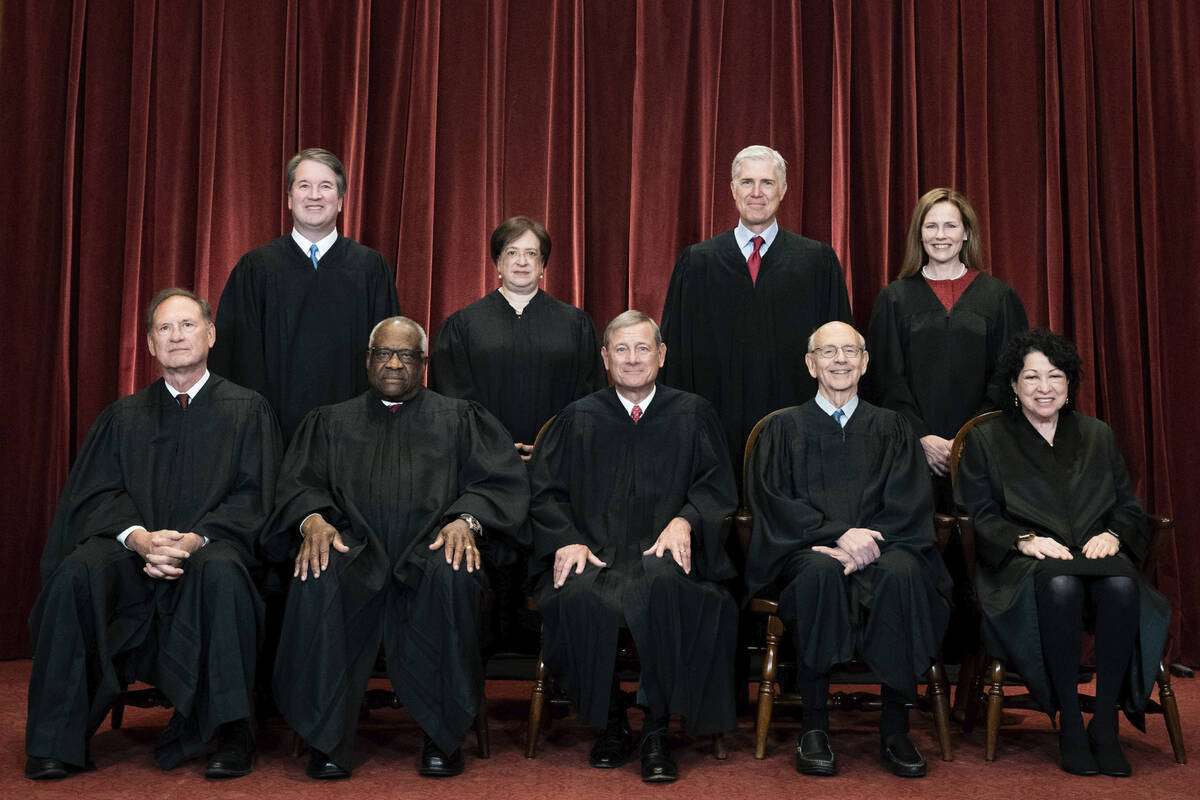Supreme Court Justice Stephen Breyer to retire
WASHINGTON – Justice Stephen Breyer is expected to announce he will retire, giving President Joe Biden the historic opportunity to fulfill a campaign pledge to fill a vacancy on the Supreme Court with the first Black woman jurist.
Breyer, 83, is a liberal member of the conservative 6-3 court. His decision to step down, to be officially announced on Thursday, allows the president the chance to preserve the current ideological makeup of the nation’s highest judicial bench.
The impending announcement was reported by several national news outlets, citing sources close to the justice.
Biden declined to comment on an expected announcement, but the White House confirmed that he would fulfill his promise to nominate a Black woman to a vacancy on the high court.
Democrats control the evenly divided Senate, which must confirm a lifetime appointment to the Supreme Court. Republicans have threatened to block a Biden nominee if they are successful in regaining the majority after the 2022 midterm election. Senate Majority Leader Chuck Schumer, D-N.Y., pledged to give any Biden nominee for the Supreme Court a Judiciary Committee hearing and full confirmation vote “with deliberate speed.”
The ranking Republican on the Judiciary Committee, Sen. Lindsey Graham, R-S.C., in a statement acknowledged that Democrats could replace Breyer without “one Republican vote in support.” Senate Majority Leader Mitch McConnell, R-Ky., led the Republicans in 2017 in eliminating the filibuster for Supreme Court nominees, after Democrats did the same with lower-court nominees in 2013.
Nevada senators praise Breyer
Nevada Democratic Sens. Catherine Cortez Masto and Jacky Rosen, in separate statements, each praised Breyer for his pragmatic approach.
“He has authored thoughtful, measured opinions in support of a woman’s right to choose, civil and voting rights, the Affordable Care Act, and the First Amendment,” said Cortez Masto, a former Nevada attorney general.
“Justice Breyer leaves a powerful legacy as a defender of good government that works for the people it represents,” she said.
Rosen voiced similar sentiments.
“From upholding the constitutionality of the Affordable Care Act to protecting reproductive freedoms and civil rights, he has delivered consequential rulings and served honorably and with integrity,” Rosen said.
Breyer is the oldest justice on the Supreme Court, appointed by President Bill Clinton in 1994. Once he’s gone, Justice Clarence Thomas, appointed by President George H.W. Bush, will become the oldest jurist at age 73.
Recently, Breyer has faced growing pressure from liberal political activists to step down to give Biden the chance to preserve the ideological composition of the court.
Justice Ruth Bader Ginsburg died just months before the 2020 election and gave President Donald Trump the opportunity to shift the balance with the appointment of conservative Amy Coney Barrett. Since then, Breyer’s retirement was sought by liberal groups who fear the historical trend that would give Republicans control of the 50-50 Senate after the November election.
Notable rulings
Breyer, a graduate of Harvard Law School, served as an assistant special counsel during the Watergate hearings in 1973, and was later counsel to the Senate Judiciary Committee. He was appointed in 1980 to the 1st U.S. Circuit Court of Appeals by President Jimmy Carter.
Breyer considered himself a pragmatist, although he usually voted with the liberal wing of the court. He disagreed with the philosophy of originalism, which holds that the Constitution should be interpreted based on the intent of its framers. In a 2002 law review article quoted on the National Constitution Center’s website, he wrote: “The real world consequences of a particular interpretive decision, valued in terms of basic constitutional purposes, play an important role in constitutional decision making.”
Breyer’s rulings were varied. In 2000, he ruled in Stenberg v. Carhart that Nebraska’s ban on partial-birth abortion was unconstitutional because it too heavily burdened the constitutional right to an abortion. In a dissenting opinion in 2015, he argued in Glossip v. Gross that the court should revisit its stance on capital punishment, arguing it violated the Eighth Amendment’s ban on cruel and unusual punishment.
In 2014, Breyer wrote for a unanimous court in National Labor Relations Board v. Noel Canning, holding that President Barack Obama’s recess appointment of two board members was improper because the Senate had been holding pro forma sessions specifically to avoid presidential recess appointments.
In 2000, he dissented in Bush v. Gore case, urging the court to return the election to Florida’s courts to better fashion an appeal. Instead, the court’s majority called an end to ballot counting and Bush was declared the winner of the election.
He was also the last member of the 5-4 majority in 2005’s Kelo v. New London, which upheld a local government’s use of eminent domain to condemn private property and turn it over to other private developers as a “public use” under the Fifth Amendment. The controversial case prompted many states to amend their laws to prohibit the use of eminent domain in those circumstances.
Breyer was part of the 7-2 majority to uphold the Affordable Care Act in the 2021 case California v. Texas, which found for Obamacare even after Congress removed a fine for failing to get minimum basic health insurance coverage.
And he ruled for free speech rights on campus, dissenting from the 2007 Morse v. Frederick case that allowed a school to punish a student who displayed a banner reading “Bong Hits 4 Jesus” at a school-supervised event. In 2021, he wrote a majority opinion that held a school district had violated a cheerleader’s rights for suspending her after she cursed in an off-campus session on Snapchat.
Breyer’s views on displaying the Ten Commandments on government property illustrate his search for a middle ground. He was the only member of the court in the majority in twin cases in 2005 that barred Ten Commandments displays in two Kentucky courthouses, but allowed one to remain on the grounds of the state capitol in Austin, Texas.
Possible successors
Among the names being circulated as potential nominees are California Supreme Court Justice Leondra Kruger, U.S. Circuit Judge Ketanji Brown Jackson, prominent civil rights lawyer Sherrilyn Ifill and U.S. District Judge Michelle Childs, whom Biden has nominated to be an appeals court. Childs is a favorite of Rep. James Clyburn, D-S.C., who made a crucial endorsement of Biden just before South Carolina’s presidential primary in 2020.
Jackson once clerked for Breyer and received Republican votes for her confirmation to the District of Columbia appellate court, often considered a stepping stone to the Supreme Court.
“I think she is the front runner,” said Carl Tobias, a University of Richmond School of Law professor and a founding faculty member of the UNLV William S. Boyd School of Law. Biden’s selection of Jackson to replace Garland, and her rulings on cases that include the release of presidential papers in connection with the Jan. 6 insurrection, as well as other legal decisions, make her a strong candidate.
“I think the odds are pretty good that she is going to get the nomination,” Tobias said.
The other candidates also have strong merits. Kruger has served on the California high court for at least five years, and Childs was recommended to Biden for an appeals court seat by Clyburn.
Regardless of who is tapped by Biden, the nomination will move quickly through the process, Tobias said. “I think they want to get it done before the midterms and that’s doable,” Tobias said.
Biden has nominated a diverse slate of candidates to federal judgeships since his election. Of the president’s confirmed nominees, 78 percent are women and 53 percent people of color, according to the left-leaning Alliance for Justice. By contrast, 76 percent of Trump’s nominees were men and 85 percent were white, Alliance for Justice statistics show.
Contact Gary Martin at gmartin@reviewjournal.com. Follow @garymartindc on Twitter. The Associated Press contributed to this story.


























